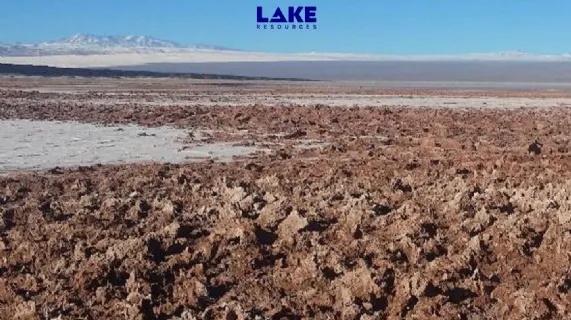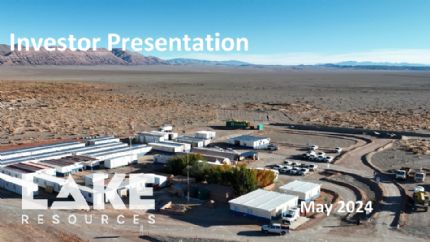
Non-Binding MoU with Hanwa Co., Ltd.
Sydney, April 2, 2022 AEST (ABN Newswire) - Lake Resources NL ( ASX:LKE) (
ASX:LKE) ( LLKKF:OTCMKTS), advises that it has signed a non-binding Memorandum of Understanding (MoU) with a major Japanese partner, Hanwa Co., Ltd. ("Hanwa") , who has an "A-" credit rating, to provide for an offtake of up to 25,000 tonnes per annum (tpa) lithium carbonate over 10 years (with an extended additional 10 years), with a minimum of 15,000 tpa LCE, from the Kachi Project, to be priced at average quarterly benchmark market prices.
LLKKF:OTCMKTS), advises that it has signed a non-binding Memorandum of Understanding (MoU) with a major Japanese partner, Hanwa Co., Ltd. ("Hanwa") , who has an "A-" credit rating, to provide for an offtake of up to 25,000 tonnes per annum (tpa) lithium carbonate over 10 years (with an extended additional 10 years), with a minimum of 15,000 tpa LCE, from the Kachi Project, to be priced at average quarterly benchmark market prices.
- Offtake proposal for up to 25,000 tonnes per annum (tpa) lithium carbonate (+/- hydroxide) at market prices from the Kachi Project in a non-binding agreement with the major Japanese partner.
- Hanwa intends to co-operate with Lake not only in marketing and distribution in Asian market but also in coordinating a strategic and sustainable supply chain with its potential customers in battery industry.
- Hanwa is considering a meaningful equity investment in order to build a solid and sustainable partnership with Lake Resources as well as other potential financial supports, such as a prepayment on offtake, trade financial facilities and project development supports.
- Intention to establish a strategic collaboration between Hanwa and Lake to develop a Clean Lithium Supply Chain to meet the environmental demands for Electric Vehicle, Stationary Battery and Cathodes' / Precursors' Manufacturers and their end customers.
- A successful outcome to negotiations will secure an "A-" credit rated offtake partner further derisks the project for financiers and investors.
The MoU also allows for Hanwa to consider providing financial support mechanisms such as a meaningful equity investment, a potential prepayment on offtake, and trade finance facilities in order to secure a long-term agreement and build up a sustainable partnership with Lake.
"In April 2021, Hanwa formed the Battery Team to create multifaceted business opportunities in the industries of electric vehicle (EV) batteries and accumulators," Mr. J. Tomono, the Corporate Officer as well as Battery Team Supervisor of Hanwa said.
"The market for lithium-ion batteries for EV is unstoppably expanding, and we are handling raw materials for those sophisticated products and increasing our involvement in all aspects of the supply chain.
"We have been seeking the right products, at scale, with the right partner, to advance development of the latest technology in batteries and its cathodes," Mr. J. Tomono also said.
Hanwa and Lake have agreed under the non-binding MoU to negotiate in good faith and use all reasonable endeavours to finalise a comprehensive legally binding agreement, in conjunction with other battery supply chain participants, including electric vehicle, battery and cathodes' / precursors' manufacturers to develop a "clean lithium" supply chain to meet the environmental demands for EV makers and their customers.
Hanwa is willing to co-ordinate a strategic partnership between not only Hanwa and Lake but also companies in the downstream of the battery supply chain to jointly develop a unique and effective supply chain "for mutual growth and sustainability."
"Hanwa has already started to discuss and consider proactive cooperation with potential partners," Mr. J. Tomono said. Lake will be providing samples and technical support to Hanwa and its potential battery supply chain partners/customers.
"The MoU reflects that Hanwa intends to move quickly to progress finalisation of the terms on a strong, longterm, binding final agreement on offtake, as well as allow for financial support for Lake," Lake's Managing Director, Mr. Steve Promnitz, said.
"Both Lake and Hanwa see this MoU as the path to finalisation of a binding long-term agreement with the ability to scale up production and participate in Lake's other projects to ensure high quality lithium products with leading ESG benefits are available to Hanwa's EV and battery customers."
Lake's Chairman, Mr. Stu Crow, said the finalisation of a binding long-term agreement with Hanwa will bolster Lake's financial position as it moves towards a Final Investment Decision later in the year.
"This MoU and finalisation of a binding offtake agreement with Hanwa will allow Lake to stay an independent supplier into global lithium supply chains and ensure security of supply to the market and potential customers."
Mr. Crow said project financing was becoming increasingly tied to ESG credentials and that investors, debt providers, and off-takers and their customers were demanding that new lithium projects adhere to strict ESG standards.
"Increasing customer and consumer scrutiny around the environmental credentials of lithium production; and concerns about security of supply has given us the confidence to enter into this partnership with Hanwa," Mr. Crow said.
He said the MoU with Hanwa, and with UK and Canada Export Credit Agencies already having indicated a willingness to project debt finance of around 70 percent of the Kachi project's capital requirements, supports Lake's TARGET 100 Program which has the goal of producing annually 100,000 tonnes of high purity lithium chemical to market by 2030.
The MoU and finalisation of a binding long-term agreement with Hanwa will provide for access to project-scale batteries to compliment a solar farm energy source at the Kachi project with trade finance at favourable rates for installation.
Hanwa has agreed to this market release. Lake will update the market on progress on the legally binding framework and other agreements as soon as it is able to do so.
About Lake Resources NL
 Lake Resources NL (ASX:LKE) (OTCMKTS:LLKKF) is a clean lithium developer utilising state-of-the-art ion exchange extraction technology for production of sustainable, high purity lithium from its flagship Kachi Project in Catamarca Province within the Lithium Triangle in Argentina among three other projects covering 220,000 ha.
Lake Resources NL (ASX:LKE) (OTCMKTS:LLKKF) is a clean lithium developer utilising state-of-the-art ion exchange extraction technology for production of sustainable, high purity lithium from its flagship Kachi Project in Catamarca Province within the Lithium Triangle in Argentina among three other projects covering 220,000 ha.
This ion exchange extraction technology delivers a solution for two rising demands - high purity battery materials to avoid performance issues, and more sustainable, responsibly sourced materials with low carbon footprint and significant ESG benefits.
| ||
|









